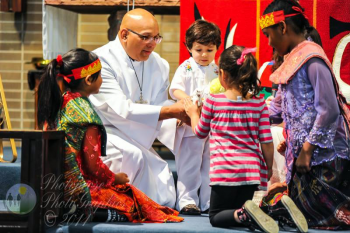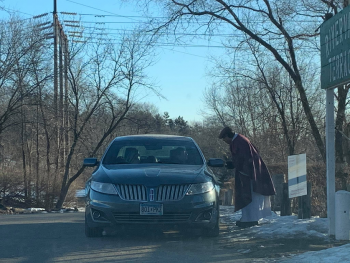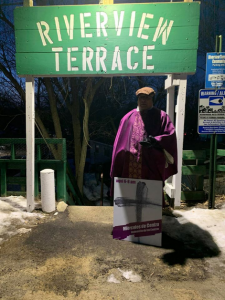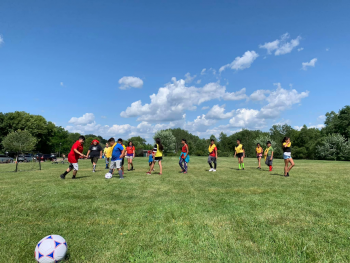By John Mai
How can Minnesota Lutherans better connect with their Latino siblings?
Several leaders in the Minneapolis Area Synod, including Pastor Jorge Espinoza, think this is an important question for congregants to ask. Over the past several years, Pastor Jorge and his wife Pastor Stephanie Espinoza have been a part of Lutheran congregations in Illinois, Colorado, and now in Minnesota. Although Jorge has been a rostered leader in the ELCA for five years, his faith journey started far from the Evangelical Lutheran Church of America.
Jorge was born in Nicaragua and was raised in the Catholic Church there. He was a Franciscan monk for 13 years while studying to become a Catholic priest. In the midst of this religious training, Jorge learned about Lutheranism from his brother, a Lutheran pastor in Costa Rica. It was there that Jorge met his now-wife Stephanie.
Pastor Deb Stehlin, the former Director of Evangelical Mission (DEM) for the Minneapolis Area Synod, knows Pastor Jorge well. She met him when he joined the synod in 2016. Together, they wrestled with the question of how to share God’s grace and love with Latino siblings in the Minneapolis area. She knows Jorge’s story, his skillset, and his faith. “He is a spiritual giant” she maintains.
Through holy wondering and discernment, Pastors Deb and Jorge strove to connect Jorge’s faith and wisdom with the Latino community. Pastor Deb explains: “I knew that Jorge Espinoza was a talented and experienced mission developer who was living in the Twin Cities and didn’t have a call. So, we just started wondering if he could be somebody who we could send out to just explore and find out if there was indeed good potential for a ministry.”
IN ELCA TERMS, THIS part of a ministry’s growth is called the exploration phase. Through this exploration, Jorge identified a trailer park in the Minneapolis suburb of Chaska that could be a good spot to begin a new, nontraditional ministry. This new ministry would be centered around an actual mobile home park.
 In a synod where the majority of churches have stained glass, organs, and pews, the idea behind this exploration was to take Lutheran witness to the community and meet people where they are at. Literally. Additionally, the residents’ primary language is Spanish and they generally have a Catholic background. These nontraditional aspects, however, made this new ministry a perfect match for Pastor Jorge.
In a synod where the majority of churches have stained glass, organs, and pews, the idea behind this exploration was to take Lutheran witness to the community and meet people where they are at. Literally. Additionally, the residents’ primary language is Spanish and they generally have a Catholic background. These nontraditional aspects, however, made this new ministry a perfect match for Pastor Jorge.
“Cristo Obrero isn’t bound by four walls and a steeple. The people of Cristo Obrero are open to use whatever space is available to them.”
After the exploration phase, the next step for a new ministry is to become a Synodically Authorized Worshiping Committee (SAWC, pronounced “sock”). Upon becoming a SAWC, Cristo Obrero was officially given its current name, which is Spanish for “Christ the Worker.” In more ELCA terms, Cristo Obrero exists as a SAWC to “test a field,” or to “test the potential of a new development,” according to the ELCA’s Policy on Criteria for Synodically Authorized Worshiping Committees. On paper, this may sound very technical, but in practice, this language enables people like Pastor Jorge to create new and beautiful ministries, according to Pastor Dick Magnus, the interim DEM for the synod.
“It’s not initially how we imagined it,” says Pastor Stephanie Espinoza, describing Cristo Obrero. She is the pastor at Cross of Peace Lutheran in Shakopee, Minnesota — a partner congregation with Cristo Obrero. A native English speaker from Minnesota, Pastor Stephanie often translates for Jorge, as he is currently taking English language classes. She offers, “It’s a different kind of church.” Cristo Obrero isn’t bound by four walls and a steeple. The people of Cristo Obrero are open to use whatever space is available to them — wherever people are gathered or whatever nature provides.
IN THE SPRING of 2019, nature provided the opportunity for an outdoor Easter egg hunt that attracted more than 40 kids. Being a family-friendly event, this Easter egg hunt provided a good starting point for Pastor Jorge to engage with people.
Following up, Pastor Jorge and other volunteers created trusting relationships with representatives of the school district, and assisted with their summer tutoring program. During a period when the tutoring program wasn’t available, Cristo Obrero put on a week-long day camp to give kids a safe place to go.
The beginning stages of this ministry didn’t come with prescribed religious packages to offer people. It hasn’t involved forcing people to buy into particular religious ideas and practices; rather, it waits for the Spirit to move people’s hearts. 
Pastor Deb is familiar with this kind of slow, patient ministry. “The way that we’re being the hands and feet of Jesus is more the accompaniment model,” she says. She describes what it looks like to follow this model: “Go and be with the people and build relationships and listen to their stories and find out what their immediate needs are. As you build relationships and meet people, find out if there’s an openness to introducing some practices of faith.”
When with the community, Pastor Jorge makes it evident that his presence is Lutheran. He wears his clerical collar when he goes to events, and he waits for the community to show their desire to engage with the Lutheran Church. Introducing Lutheranism little by little, Pastor Jorge held Las Posadas (a Latin American Christmas celebration) later in 2019, and provided the community with ashes-to-go out in the community on Ash Wednesday this year.
At these early stages in the life of Cristo Obrero, Pastor Jorge’s ministry can be summed up in one word: abiding. In Pastor Deb’s words, abiding is “the power of presence that says ‘I’m here and I’m not going anywhere.’” This is significant because people in underprivileged communities often experience the exact opposite. Stehlin continues, “The people who live in the mobile home park have experienced nice Christians coming in and doing something episodically, and then going away and never coming back again. And boy they feel good about helping those poor people.” This contrast speaks to the core of Cristo Obrero’s purpose. This ministry does not exist simply to do good episodically. In the words of Cristo Obrero’s mission statement, it exists “to strengthen understanding that the work of Christ is love for all.”
“Pastor Stephanie says that Cristo Obrero’s ministry often looks like ‘preaching without using words.’”
Pastor Dick Magnus has learned much about what he calls Cristo Obrero’s “excellent model” of ministry. He believes that Jorge has been successful at creating a promising ministry because of the trusting relationships he has built within the mobile home park and in the surrounding community. And these relationships didn’t start with worship, according to Pastor Dick, but by “build[ing] on the faith that’s already there.”
 Pastor Stephanie says that Cristo Obrero’s ministry often looks like “preaching without using words.” She explains that Cristo Obrero’s summer soccer program in 2019 relied on volunteers from its partner congregations to help facilitate the games. This volunteer support freed Jorge to be available to talk with parents, listen to their needs, and practice that ministry of being present. And the outside help made that ministry of presence possible.
Pastor Stephanie says that Cristo Obrero’s ministry often looks like “preaching without using words.” She explains that Cristo Obrero’s summer soccer program in 2019 relied on volunteers from its partner congregations to help facilitate the games. This volunteer support freed Jorge to be available to talk with parents, listen to their needs, and practice that ministry of being present. And the outside help made that ministry of presence possible.
Over the past year, Cristo Obrero has demonstrated the potential for the Minneapolis Area Synod to better connect with its Latino siblings. Already with a presence in the Riverview Terrace and Brandondale mobile home parks, Cristo Obrero has its sights set on expanding its ministry into two additional sites.
THE SYNOD’S ASSISTANT to Mission Lynda Nordholm has been working with new and developing ministries for 20 years. She believes that the support that Cristo Obrero has received from its partnering communities and congregations is “unparalleled.”
Because of the nature of SAWC’s as new ministries, they often have limited access to resources. They depend on the benevolence of partner congregations to serve God’s people. Partner congregations give not only financial support to SAWC’s, but their support also includes less tangible things like volunteers, friendship, and prayers.
Although this may seem like a one-sided relationship, Lynda likes to think of partnering with new ministries as mutually beneficial. In addition to the new ministry receiving various kinds of support, partner congregations receive the value of a neighboring ministry. They get to experience what ministry is like outside of their own church, and they witness their own congregation members grow into faith leaders.
When churches with deep roots partner with ministries that are young and sprouting, the fruits of that labor grow on both sides of the relationship. As church councils review their budgets, new and developing ministries become an option for these new financial and relationship opportunities. For questions about how you can best offer your support, contact Lynda Nordholm at l.nordholm@mpls-synod.org.
